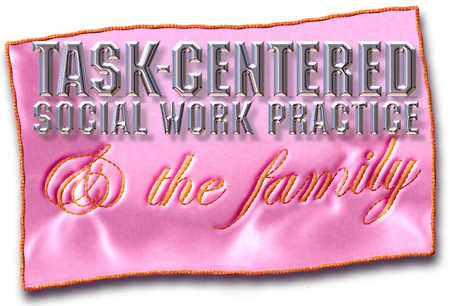 |
| SITE MAP |
|
OVERVIEW FAMILY CASE TASK LINKS CREATORS |
A SAMPLE TASK PLANNER
FOR "ROS WHITE"
Initial Phase
Assessment, based on client's own construction of problem
- Her home environment (ceiling crumbling on children)
- Her desire to keep her children in her home
- Her desire to keep CPS off her back
- Her fear of legal problems (potential prostitution charges)
- Providing for her family
Exploration
- How, when, where, why they came about
- Ros had increasing trouble with structure since leaving home
- Landlord has been unresponsive since she moved in
- Needing money to repair apartment, turned to prostitution
- CPS/legal hassles - How the client has coped with them up until now
- Ongoing problems, except during residence with Mother - Additional data may be gathered through
standardized instruments
- Should we evaluate Ros for PTSD or GAD? These may represent obstacles to her realizing her goals, and potential resources through SSI who offers support for people with these disorders

Setting Goals
- Worker guides client to choose no more than 3
solvable problems
- Improving home environment
- Keeping her children
- Her legal problems - The social worker may make mental notes about
other, perhaps hidden problems
- For Ros to keep her children, she will need to stop prostitution - From "menu of treatments," suggest
personalized, integrative intervention
- A possible "menu" for Ros (after Reid 2000)
- Psychoeducational approach
- Problem-solving approach
- Life-skills training - Collaborate on creating an explicit contract
Middle Phase
Task planning, for both client (home) and practitioner (typically during session)
- Worker (psychoeducational approach)
- Educate Ros on effects of parental neglect - Client
- Identify which effects children may be demonstrating
- Identify which client behaviors may be neglectful
- Identify factors that may be leading to inadequate care - Worker (problem-solving approach)
- Training in problem-solving skills
- Possibly arrange for 24-hour access for emergent issues (child care) - Client
- Outline steps to correct specific deficits (contact landlord for repairs)
- Include adjustments for difficult tasks (role-play discussion with landlord) - Worker (life-skills training)
- Train in budgeting, bill paying, résumé writing, job application - Client
- Prepare a résumé as home assignment
Implementation Sequence
- Provide necessary training during session
- Review client's and practitioner's
progress on tasks in each session
- Tasks not completed are reviewed to resolve obstacles
- Obstacles may be external, such as a recalcitrant government agency
- Obstacles may be internal feelings, ("resistance," "avoidance")
- Resolution through understanding obstacles or revising plan/tasks
- Ros fails to keep an appointment with CPS for two weeks running
- Worker helps client identify and resolve obstacles
- Ros does not trust CPS because "They twisted words so I didn't know what they meant and they took my babies last time"
- Worker wonders if Ros would feel safer having someone accompany her who "knows the system"
- Worker offers to attend the next meeting with Ros
Ros agrees and expresses thanks

Termination Phase (and Durational Limits)
Final Problem Review
- Ros has arranged for ceiling to be fixed
- CPS has not taken children yet, but has begun court proceedings
- Ros faces misdemeanor charges surrounding her prostitution
Review of Accomplishments
- Ros has successfully learned to confront landlord (and authority figures)
- Ros has learned a good deal about child neglect and made some life changes
- Ros has discovered she has resources in the job market
- Ros has discovered she has resources through SSI and DSS
Future Plans
- Suggest Treatment Extension to deal with unresolved
issues
- Problem-solving around legal/CPS issues
- Problem-solving around income/career change
- Treatment for PTSD issues